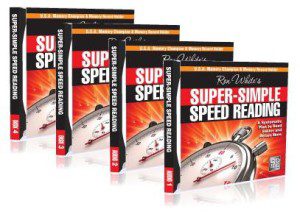We read differently for different reasons. Reading a math book is not the same as reading a magazine article, sitting down to a relaxing novel or taking in several chapters of a textbook for class. All of them require comprehension, but you will need to vary your speed according to the subject matter and how much you want to get out of it.
For the math book you need to spend time concentrating and understanding how the problem is laid out and how you would go about solving it. That requires reading at a slower pace and going back a few times so that it soaks in (review is good for memory retention).
 Reading a magazine is often just a matter of skimming over the content until something catches your eye. With a novel you want to relax and enjoy all the aspects so you can savor each moment. Textbooks often contain a lot of fill, but you want to be able to catch the high points while still covering a lot of territory in a short period of time.
Reading a magazine is often just a matter of skimming over the content until something catches your eye. With a novel you want to relax and enjoy all the aspects so you can savor each moment. Textbooks often contain a lot of fill, but you want to be able to catch the high points while still covering a lot of territory in a short period of time.
Our brains process a great deal of information through reading on a daily basis. How we read can be accomplished in one of four ways, all of which are used in speed reading techniques:
- Skimming — running our eyes over the text in order to find the important pieces of information
- Scanning — searching for specific pieces of information
- Extensive Reading — usually for pleasure, such as a novel
- Intensive Reading — reading for detail, usually done in short paragraphs at a time because the material is more difficult to take in (like math)
Sometimes the material requires that we use only one of the above, while other times we use a combination of all of them. For example, for a research paper you may skim over the material until you find the area you are looking for; scan for specific information from within that area; go into intensive reading when you are trying to remember the fine points; and you may resort to extensive reading if the subject matter is appealing to you.
As children we were taught to read by speaking the words out loud. As we got better at reading we still sounded out the words silently by moving our lips. Although reading is an “active” process it is most efficient when done “silently.” Moving your lips requires a brain function that is not necessary, or efficient.
Not all text is read at the same speed, as indicated above. When we read our eyes do not usually follow each word. A speed-reader will learn to focus on all the words on the page, but train their eyes to take in more of the area. We tend to skim over words or expressions, go back if we think we missed something, and sometimes go forward to see if we are correct in our assumptions.
When we read aloud you actually prevent ourselves from developing efficient reading strategies. Our brains have been trained to see the word, speak the word, and then process the image -— like when you read the word “train” aloud your brain translates it and then visualizes it. In speed-reading you eliminate the need for the brain to process the word.
Consider the text as a whole — title, pictures, diagrams, text, font, etc. Skim through the text the first time to see if your assumptions are correct. Ask yourself questions about what you have taken in, then read the text again more slowly and carefully — trying to answer the questions you had when you skimmed the article the first time.
When you are trying to improve study skills and become a more efficient reader, teachers will often encourage their students to time themselves on what they read, little by little increasing their speed. Speed reading courses help to develop the reading efficiency by timing the exercise, then presenting a quiz or comprehension exercise to test how much they retained. Students should keep a record of their results to show their progress.
Becoming aware of the function of the text is important to comprehension. Predicting what is to come next is a skill to develop. Try to think ahead, to what the text is trying to tell you, and then try to predict what comes next, or the conclusion, and then go back to review if you guessed correctly. If you run into an area that confuses you, write it down to reference it later. Ask questions as you are reading — and even write down questions. Associate what you read with what you already know.
Look for clues as to the point the writer is trying to make — like how is the page is laid out, how does the writer forms his sentences, and what do the photos say about the article?
Take notes! Writing down the key ideas in your own words will help you remember, and reminds you to check up on things you don’t understand as you are reading. Using your own reactions and ideas when taking down notes will help you to understand and remember them later.
Write a summary. The summary should be an emotionless, yet accurate account of what you read. Reading comprehension is about your ability to put together and evaluate what you have read. In order to do it properly you need to understand the writer’s intention when he wrote the piece, including any bias. Be open to looking for and distinguishing between fact and opinion.
There are speed-reading courses, such as the one I coach, that will help you to develop your reading efficiency and comprehension. They will not only improve your grades in school and with test taking, but also help make your professional life easier by improving your memory.
From the desk of Ron White
Sources:
Reading Study Skills by Bonny Bucknam: http://www.articlesbase.com/education-articles/reading-study-skills-2739834.htm
Cambridge Language Teaching Library — Developing reading skills: a practical guide to reading comprehensión exercises By Françoise Grellet: http://books.google.com/books?id=fE8JDzVyTLIC&printsec=frontcover&dq=developing+reading+skills&source=bl&ots=RzhvR5-k1F&sig=CdXqiY0NAnkQLQcPUHgYhj5cmtM&hl=en&ei=GqOtTZjxDKfv0gGw_MGrCw&sa=X&oi=book_result&ct=result&resnum=9&ved=0CG0Q6AEwCA#v=onepage&q&f=false
Time for Learning: http://www.time4learning.com/readingpyramid/comprehension.htm





